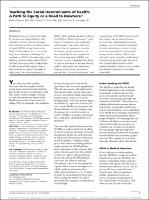| dc.description.abstract | Medical schools are increasingly called
to include social responsibility in their
mandates. As such, they are focusing
their attention on the social determinants
of health (SDOH) as key drivers in the
health of the patients and communities
they serve. However, underlying this
emphasis on SDOH is the assumption that
teaching medical students
about
SDOH
will lead future physicians to take
action
to help achieve health equity. There is
little evidence to support this belief. In
many ways, the current approach to
SDOH within medical education positions
the SDOH as “facts to be known” rather
than as “conditions to be challenged
and changed.” Educators talk about
poverty but not oppression, race but
not racism, sex but not sexism, and
homosexuality but not homophobia.
The current approach to SDOH may
constrain or even incapacitate the ability
of medical education to achieve the very
goals it lauds, and in fact perpetuate
inequity. In this article, the authors
explore how “critical consciousness” and
a recentering of the SDOH around justice
and inequity can be used to deepen
our collective understanding of power,
privilege, and the inequities embedded
in social relationships in order to foster
an active commitment to social justice
among medical trainees. Rather than
calling for minor curricular modifications,
the authors argue that major structural
and cultural transformations within
medical education need to occur to make
educational institutions truly socially
responsible. | |

